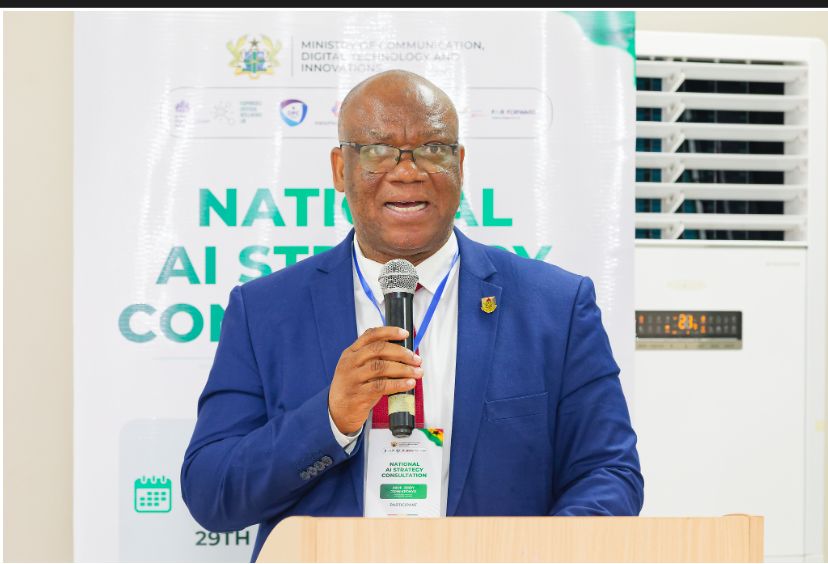Ghana is marking a critical step toward finalising the country’s blueprint for Artificial Intelligence (AI) development.
Stakeholders from academia gathered at the Kwame Nkrumah University of Science and Technology (KNUST) for the second National AI Strategy Consultation.
This meeting builds upon an initial consultation with technologists and AI creators, further involving academia in shaping the nation’s AI future.
The national AI strategy is expected be finalized by June 2025.
Technical Advisor for GIZ’s FAIR Forward, Elikplim Sabblah, underscored the productive deliberations on the draft strategy, emphasising GIZ’s commitment to supporting Ghana’s digital transformation.
Prof. Jerry John Kponyo, AI4SD Project Lead and Principal Investigator of the Responsible AI Lab (RAIL), indicated AI’s potential to accelerate Ghana’s economic growth and the Sustainable Development Goals (SDGS).
He presented the strategy’s mission, vision, and eight key pillars, with recommendations including, launching an “AI-ready Ghana” program, and expanding AI education, particularly developing short courses for the public sector.

Prof Kponyo further highlighted on partnering with cloud providers and strengthening national data infrastructure and enforcing data governance and open-data initiatives.
He also announced plans to establish a Responsible AI Office to oversee implementation, ensuring ethical and inclusive AI adoption.
The RAIL is spearheading all the processes which will lead to the comprehensive review and adoption of the National AI Strategy.
Dr. Arnold Karvaapuo, representing Ghana’s Minister of Communication and Digital Technology, Samuel Nartey George, described the strategy as a “blueprint for Ghana’s digital future.”
He outlined AI’s transformative potential in agriculture, healthcare, logistics, and financial inclusion, reaffirming the government’s ambition to make Ghana “Africa’s AI hub.”
He also emphasized the four priority areas the national AI strategy is being anchored on: data as a national asset, computing power as the engine of the AI economy, and building Ghana’s digital workforce, starting with the 1 Million Coders program launched.
Science and Innovation Officer at the British High Commission, Accra, Johnson Masagotin Singir, reiterated the UK’s partnership with Ghana, emphasising AI’s role in driving inclusive growth.
He highlighted academia’s importance in fostering innovation, ethical AI discourse, and interdisciplinary collaboration.
Vice-Chancellor of the KNUST, Prof. Mrs. Rita Akosua Dickson, stressed the urgency of developing an AI-ready workforce and announced an AI in Education Summer School in October 2025.
“This consultation brings together the brightest minds and critical stakeholders to chart a strategy that is all-inclusive, forward-thinking, responsible and grounded in Ghana’s unique developmental context,” she said.
Darlington Akogo, CEO of MinoHealth AI Labs, made a compelling case for AI’s economic potential, estimating a $20 billion boost to Ghana’s GDP by 2030.
“AI offers higher returns than traditional assets like cocoa and oil—and it will enhance these sectors,” he argued. He called for an AI National Fund of $ 500 million to $ 1 billion and urgent prioritisation of AI development,” he said.
As a consultative dialogue that invited various expertise in the AI space, the stakeholders – including focused groups and the audience- emphasised an Inclusive AI that would engage the youth and Persons with Disabilities (PWDs), and Capacity building which would leverage existing institutions.
There were concerns on ensure data quality that would harness indigenous Ghanaian datasets, ethical governance where innovation balances with regulation and Cultural preservation where AI would be harnessed to safeguard Ghanaian heritage.
A third consultation with the judiciary is expected to happen alongside public feedback on the strategy which has been touted as the “People’s Strategy” for national progress.
DISCLAIMER: The Views, Comments, Opinions, Contributions and Statements made by Readers and Contributors on this platform do not necessarily represent the views or policy of Multimedia Group Limited.
